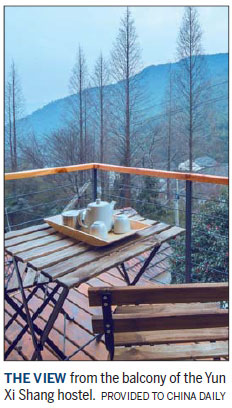Getting back to basics
Updated: 2016-04-29 08:24
By Xu Xiaomin(China Daily Europe)
|
|||||||||
In Chinese culture, intellectuals are supposed to dream of living like hermits in the countryside after they have attained a deep understanding of life and achieved success in their career or in academia. In the old days, many gave up living in the city and moved to villages to embrace nature.
This tradition has existed for thousands of years.
Now, Ji Xiaoxiang and Yang Mohan, both 33 and graduates of Tongji University's Urban Planning School in Shanghai, have made that journey to the village.
|
The boutique hostel Da Le Zhi Ye, which is minimalist and comfortable, is located in Deqing county in Zhejiang province. |
After spending several years designing urban developments, they say they were left disenchanted, as many projects did not become a reality. Determined to find a new challenge, they traveled extensively in search of something that aligned with their skills.
They eventually ended up in Biwu, a village in Deqing county in the eastern province of Zhejiang.
"It was New Year's Day, 2013. It was snowing heavily the day we arrived in Biwu and the whole place was covered in soft, white snow," Ji recalls. "Yang and I were standing on the terrace of an old farmer's house, looking at the mountains, and it was there we decided this was the place."
The men rented the old house and spent their savings transforming it into a boutique hostel, Da Le Zhi Ye, the name of which comes from an ancient book, The Classic of Mountains and Rivers.
Ji had never lived in the countryside before but now prides himself on successfully integrating with the local community.
The hostel features huge windows, which let in copious amounts of natural light, and a small cafe that serves a decent Americano. Minimalist but comfortable, it also has a terrace where guests can relax and admire the starry skies.
There is a serenity that permeates the place that can't be found in a metropolis, and when night falls only the sounds of a nearby stream can be heard. "This is the way life should be," Ji says.
Yang and Ji are among a small group of urban elites who have done the opposite of young people from the villages, who still think the only measure of success is to own an apartment and have a decent job in cities like Shanghai and Beijing.
Ask any of the 274 million migrant workers in China about his or her reason for seeking work in the big cities and the most likely reason will be that farming, with its harsh conditions and meager income, is simply not worth it.
According to the National Bureau of Statistics, residents in urban areas earned 1.73 times more than their rural counterparts last year, down from 2.3 times in 2009. The income gap is the predominant factor that influences millions of farmers, especially young people, to abandon their hoes and head to greener pastures in the cities, with many of them ending up on construction sites and assembly lines.
In recent years, however, some people - mostly young and well-educated - have been going against the grain, heading from major cities to relatively remote regions, such as Deqing, to pursue their dreams.
"I hope to go even further," Ji says. "My plan is to be more involved in the local community of this beautiful place."
Remodeling old homes is merely the first step in his plan, he explains. He believes the slow village life can be made more colorful and energetic to attract a greater number of visitors from the city, which would in turn provide business for villagers.
Today's Top News
Warren Buffett optimistic on China's economic transition
Hawking answers ancient Chinese philosophical question
Running the world
Getting back to basics
Alibaba denies reported takeover of AC Milan
China stresses Putin's expected visit
Russia launches rocket from Vostochny Cosmodrome
Record number of Chinese exhibitors at Spanish expo
Hot Topics
Lunar probe , China growth forecasts, Emission rules get tougher, China seen through 'colored lens', International board,
Editor's Picks

|

|

|

|

|

|









